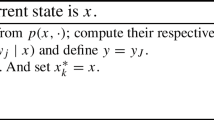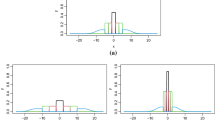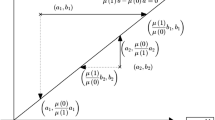Abstract
The multiple try Metropolis (MTM) method is a generalization of the classical Metropolis–Hastings algorithm in which the next state of the chain is chosen among a set of samples, according to normalized weights. In the literature, several extensions have been proposed. In this work, we show and remark upon the flexibility of the design of MTM-type methods, fulfilling the detailed balance condition. We discuss several possibilities, show different numerical simulations and discuss the implications of the results.




Similar content being viewed by others
Notes
Recall that \(y_i\) are drawn from \(\pi _i(\cdot |x)\) whereas \(x_i^*\) are drawn from \(\pi _i(\cdot |y),\,i=1,\ldots ,k-1,k+1,\ldots N\) and \(x_k^*=x_{t}=x\).
Note that the balance condition is a sufficient but not necessary condition. Namely, the detailed balance ensures invariance. The converse is not true. Markov chains that satisfy the detailed balance condition are called reversible.
However, it is important to remark that high acceptance rates are not a suitable indicator of good performance since, in general, the best acceptance rate is different from 1 (Roberts et al. 1997).
Another simple MTM scheme is the “orientational bias Monte Carlo” (Frenkel and Smit 1996, Chapter 13). In this case, the proposal pdf must be symmetric, i.e., \(\pi (y|x)=\pi (x|y)\), and the weights must be proportional to the target, i.e., \(\omega (y_i)=p(y_i),\,i=1,\ldots ,N\).
Note that, in this work, we have mainly considered scalar variables in order to simplify the treatment and the notation. All the considerations and algorithms contained in this work are also valid for multi-dimensional variables (see, for instance, the last numerical example in Sect. 6.6).
We do not provide the estimated linear correlation because of the moments (as the mean, for instance) of the target do not exist, and it makes difficult a right estimation of the correlation.
References
Barker AA (1965) Monte Carlo calculations of the radial distribution functions for a proton–electron plasma. Aust J Phys 18:119–133
Bédard M, Douc R, Mouline E (2012) Scaling analysis of multiple-try MCMC methods. Stoch Process Appl 122:758–786
Brooks SP (1998) Markov Chain Monte Carlo method and its application. J R Stat Soc Ser D (The Statistician) 47(1):69–100
Casarin R, Craiu R, Leisen F (2013) Interacting multiple try algorithms with different proposal distributions. Stat Comput 23(2):185–200. doi:10.1007/s11222-011-9301-9
Craiu RV, Lemieux C (2007) Acceleration of the multiple-try Metropolis algorithm using antithetic and stratified sampling. Stat Comput 17(2):109–120
Devroye L (1986) Non-uniform random variate generation. Springer, Berlin
Fitzgerald WJ (2001) Markov Chain Monte Carlo methods with applications to signal processing. Signal Process 81(1):3–18
Frenkel D, Smit B (1996) Understanding molecular simulation: from algorithms to applications. Academic Press, San Diego
Gamerman D, Lopes HF (2006) Markov Chain Monte Carlo: stochastic simulation for Bayesian inference. Chapman and Hall/CRC, Boca Raton
Gilks WR, Richardson S, Spiegelhalter D (1995) Markov Chain Monte Carlo in practice: interdisciplinary statistics. Taylor & Francis, Inc., UK
Haario H, Saksman E, Tamminen J (1999) Adaptive proposal distribution for random walk Metropolis algorithm. Comput Stat 14:375–395
Haario H, Saksman E, Tamminen J (2001) An adaptive Metropolis algorithm. Bernoulli 7(2):223–242
Hastings WK (1970) Monte Carlo sampling methods using Markov chains and their applications. Biometrika 57(1):97–109
Lan S, Stathopoulosy V, Shahbaba B, Girolami M (2012) Langrangian dynamical Monte Carlo. arXiv:1211.3759v1
Liang F, Liu C, Caroll R (2010) Advanced Markov Chain Monte Carlo methods: learning from past samples. Wiley Series in Computational Statistics, England
Liu JS, Liang F, Wong WH (2000) The multiple-try method and local optimization in Metropolis sampling. J Am Stat Assoc 95(449):121–134
Liu JS (2004) Monte Carlo strategies in scientific computing. Springer, Berlin
Martino L, Del Olmo VP, Read J (2012a) A multi-point Metropolis scheme with generic weight functions. Stat Probab Lett 82(7):1445–1453
Martino L, Read J, Luengo D (2012b) Improved adaptive rejection Metropolis sampling algorithms. arXiv:1205.5494v4
Metropolis N, Rosenbluth A, Rosenbluth M, Teller A, Teller E (1953) Equations of state calculations by fast computing machines. J Chem Phys 21:1087–1091
Mira A (2001) On Metropolis–Hastings algorithms with delayed rejection. Metron 59:231–241
Pandolfi S, Bartolucci F, Friel N (2010) A generalization of the multiple-try Metropolis algorithm for Bayesian estimation and model selection. J Mach Learn Res (Workshop and conference proceedings volume 9: AISTATS 2010) 9:581–588
Peskun PH (1973) Optimum Monte-Carlo sampling using Markov Chains. Biometrika 60(3):607–612
Qin ZS, Liu JS (2001) Multi-point Metropolis method with application to hybrid Monte Carlo. J Comput Phys 172:827–840
Robert CP (2012) “Xi’ An’s Og, an attempt at bloggin... ” Blog (by Christian P. Robert). http://xianblog.wordpress.com/2012/01/23/multiple-trypoint-metropolis-algorithm/
Robert CP, Casella G (2004) Monte Carlo statistical methods. Springer, Berlin
Roberts GO, Gelman A, Gilks WR (1997) Weak convergence and optimal scaling of random walk Metropolis algorithms. Ann Appl Probab 7:110–120
Storvik G (2011) On the flexibility of Metropolis–Hastings acceptance probabilities in auxiliary variable proposal generation. Scand J Stat 38(2):342–358
Tierney L (1994) Markov chains for exploring posterior distributions. Ann Stat 33:1701–1728
Tierney L, Mira A (1999) Some adaptive Monte Carlo methods for Bayesian inference. Stat Med 18:2507–2515
Zhang Y, Zhang W (2012) Improved generic acceptance function for multi-point Metropolis algorithm. In: 2nd International conference on electronic and mechanical engineering and information technology (EMEIT-2012)
Acknowledgments
We would like to thank the Reviewers for their comments which have helped us to improve the first version of manuscript. Moreover, this work has been partially supported by Ministerio de Ciencia e Innovacin and by the Ministerio de Economía of Spain (project MONIN, ref. TEC-2006-13514-C02- 01/TCM, project COMONSENS, id. CSD2008-00010, project DEIPRO ref. TEC2009-14504-C02-01, project ALCIT, id. TEC2012-38800-C03-01 and project COMPREHENSION, id. TEC2012-38883-C02-01) and Comunidad Autonoma de Madrid (project PROMULTIDIS-CM, ref. S-0505/TIC/0233).
Author information
Authors and Affiliations
Corresponding author
Rights and permissions
About this article
Cite this article
Martino, L., Read, J. On the flexibility of the design of multiple try Metropolis schemes. Comput Stat 28, 2797–2823 (2013). https://doi.org/10.1007/s00180-013-0429-2
Received:
Accepted:
Published:
Issue Date:
DOI: https://doi.org/10.1007/s00180-013-0429-2




